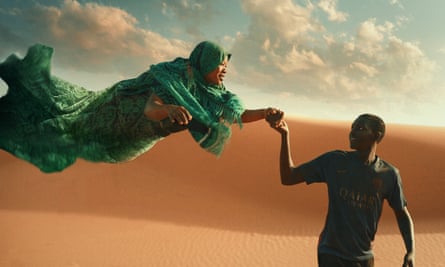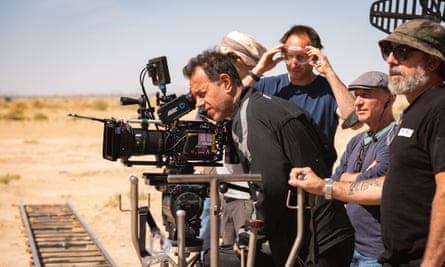Italian director Matteo Garrone is a reliable crusher of hopes and aspirations. In his 2008 breakthrough crime drama Gomorrah, two fresh-faced Neapolitan youngsters aspire to emulate the mobsters they’ve seen portrayed in American gangster movies: they end up being shot by a bunch of pot-bellied mafia grandpas in flip-flops, and carted off by a digger.
Garrone’s 2019 retelling of Pinocchio had the titular wooden boy join a caravan of children headed for a mythical Land of Toys – only to be transformed into a donkey, crippled in a circus show, and thrown into the sea. Wide-eyed boys who dare to dream ending up as landfill is such a persistent theme in the 54-year-old Roman film-maker’s works, it’s probably quite useful that the two teenage protagonists of his most recent project weren’t familiar with his back catalogue before they signed up.
But then Io Capitano (Me, Captain), which will compete for the Golden Lion at this year’s Venice international film festival, is a departure in more ways than one. Telling the story of Senegalese teenagers Seydou and Moussa’s odyssey from their Dakar homes to the shores of Europe, it is the first film in which Garrone doesn’t explore Italy from within but through the eyes of those who make it their destination in the hope of a better life.
“I tried to change the point of view,” he says, speaking on video call from Rome. “It’s a reverse shot of what we are used to seeing. We are used to having the camera in Europe, watching people arriving over the sea, sometimes alive, sometimes dead. I wanted to show the part we should know about but don’t.”
Since the number of first-time asylum seekers in the European Union surged above the 1 million mark in 2015, the stories of the people who have crossed the Mediterranean on boats have been told in numerous documentaries but fewer feature films than one might have expected.
Director Simon Verhoeven’s 2016 film Willkommen bei den Hartmanns (Welcome to the Hartmanns’) got some comic mileage out of German awkwardness, but left the Nigerian refugee newcomer in their midst as little more than plot device. In A Bigger Splash, by Garrone’s compatriot Luca Guadagnino and released that same year, the people whose boats land on Sicily’s beaches are mere shadowy figures in the background.
The trend is about to turn: in the main competition at Venice, Garrone is up against Polish director Agnieszka Holland’s Zielona granica (Green Border), set on the Belarusian-Polish border where migrants from the Middle East and north Africa sought entry into the EU in 2021.
Nonetheless, Garrone acknowledges, the inherent risk of making a “refugee drama” is that it ends up telling the story of categories rather than individuals, painting people either as passive victims or elevating them into superhuman heroes.
“I was fully aware of the danger of how delicate this subject would be, and it took me many years to work out the approach I was going to have,” he says. “My guiding light was to be as true to myself and reality as possible, and to keep it simple – and it’s quite tough to keep things simple when you’re making art.”
While visiting a refugee shelter in Sicily, he came across the story of a 15-year-old boy who had been incentivised to steer a boat carrying 250 people across the Mediterranean without any navigating experience – a tactic people smugglers have employed since Italian prosecutors started using anti-mafia laws to arrest the vessels’ helmsmen, the capitani of the title, upon their arrival in Europe.

“I was entering a culture that wasn’t my own, and in order to make a movie I had to make it not just about them but with them,” Garrone says. “Every moment on the set, I had people beside me who had actually lived through the experience of being tortured in Libya, or walked through the Sahara, so they could help me tell their experience in detail.”
As his protagonist, he cast Seydou Sarr, an exceedingly shy 17-year-old with no acting experience but a passion for film and music. His waggish cousin Moussa is played by Moustapha Fall, also 17 at time of filming, who had taken some acting classes in Dakar. But language proved a challenge. Garrone’s Italian script had to be translated into French and then orally passed on to the cast in Wolof, the most widely spoken language in Senegal. “I could only rely on the sound of their voices to tell if they were acting well,” says Garrone.
Starting his tale in the west African republic was in itself a potentially polemical choice. Senegal has only in recent years become a country where people migrate from rather than to, and the main driver for those leaving the country is economic insecurity rather than war or famine.
Io Capitano opens with a shot of Seydou looking on in polite boredom as his younger sisters try on orange wigs, braid their hair and paint their fingernails. It’s not unhappiness that is making him and his cousin want to leave their homes, but a longing for adventure. “Europe is waiting for us,” Moussa assures Seydou after their elders warn them that the continent will be nothing like it is in their imagination. “White people will be asking you for autographs.”
“Migration has many different reasons: to escape wars, the effects of climate change, living in absolute poverty,” says Garrone. “The subject of the film is another type of migration, which is connected to Africa’s demographic – 70% of sub-Saharan Africa is under the age of 30 – and globalisation.”
While contemporary migration from Africa to Europe bears some resemblance to that of his grandparents’ generation to the United States, he says, there are some crucial differences. “We sometimes assume globalisation only affects the western world. Well, that’s wrong. In Africa, too, people have access to social networks, smartphones and televisions. They have a window on Europe that is constantly open, and it’s quite human and natural that they are prompted to live in a place that seems more attractive.

“They want to travel and know the world just like we do. They see people their age travelling from France to Senegal, and they don’t understand why they are not allowed to do the same thing heading the other way. The story of that kind of migration is not very much told in films.”
Should Seydou and Moussa have stayed at home? “The answer depends on the personal view of whoever watches the movie. I don’t give answers. I tell the story of their journey and try to let the audience subjectively live their emotional experience. After that, it’s up to the viewers to draw their own conclusions.”
Garrone’s record of crushing his boyish protagonists’ hopes doesn’t bode well. The real-life capitano the film is based on, he mentions at one point, went to jail for six months as soon as he arrived in Italy. “Now with the news we have in Italy, that could be 20 years,” he adds, with a bitter laugh.
Mafia drama Gomorrah caught the world’s attention because it deromanticised an entire genre. But Garrone’s emotional palette has brightened in the 15 years since that film made his name. In Io Capitano, there are moments on Seydou and Moussa’s journey that bear closer resemblance to the fairytale escapism of his version of Pinnocchio: like the wooden boy of Carlo Collodi’s 19th-century folk tale, Seydou doesn’t break easily.
“Youth has the arrogance to challenge life – that’s a quality that Seydou and Moussa also share with the boys in Gomorrah. But I wanted to give the audience a chance to breathe, as terrifying as their experience may be.”
● Io Capitano premieres at the Venice film festival on 6 September.
